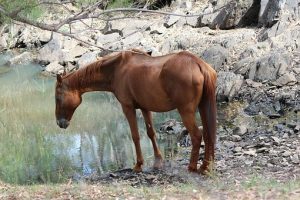Many of the paddocks on horse farms have limited shade available for horses – which means horses can easily get overheated in summer months! While Virginia’s climate is milder than much of the southern United States, horse owners still need to take certain precautions to maintain their horses’ health while temperatures are high.
Tips to Prevent Heat Stress
 Horse owners – particularly the owners of horse farms who are responsible for many animals – need to take special care to reduce their horses’ stress and maintain their health during Virginia summers. When temperatures rise, make sure your farm is equipped with everything you need to prevent your horses from suffering heat stress – an avoidable, potentially fatal condition. Follow these tips to prevent heat stress before it starts:
Horse owners – particularly the owners of horse farms who are responsible for many animals – need to take special care to reduce their horses’ stress and maintain their health during Virginia summers. When temperatures rise, make sure your farm is equipped with everything you need to prevent your horses from suffering heat stress – an avoidable, potentially fatal condition. Follow these tips to prevent heat stress before it starts:
- Make sure that your horses can freely access cool water throughout the day. Hot horses should take a few swallows of water every few minutes to ensure that they don’t become dehydrated.
- Try not to ride your horse when it’s really hot and humid. If you have to ride, ride for a brief time period during the coolest part of the day and allow for frequent water breaks.
- Provide horses with access to shade throughout the day. Keep in mind that the position of the sun changes throughout the day and that horses will need access to shade at all times.
The Stages of Heat Stress – And Signs Your Horse is Suffering
If your horse exhibits signs of heat stress, you should intervene immediately. The effects of heat stress on horses range from poor performance to heatstroke, which can be fatal. Summers in Virginia are hot and humid, so horse owners need to be aware of the stages of heat stress.
- Dehydration: The first stage of heat stress is dehydration. A severely dehydrated or overexerted horse won’t drink water even though it needs to, so if a horse that isn’t drinking may actually be in need of water. Check for dehydration by pinching the horse’s skin. The skin of a well-hydrated horse snaps back into place in less than a second.
- Heat Exhaustion: Horses in the second stage of heat stress could suffer a heat stroke if they do not receive immediate medical intervention. In this stage, the horse’s fluid is running low, so it does not sweat or sweats only a little. Because of this, the horse is unable to do anything to cool itself to prevent heatstroke.
- Heat Stroke: Heat exhaustion can quickly lead to heatstroke if the horse is not cooled down. Heatstroke can cause neurological damage to horses, so start cooling your horse down and contact a veterinarian immediately if you notice signs of heat exhaustion.
Caring for an Overheated Horse
If you notice any of the signs that your horse is suffering from heat stress, you need to take steps immediately to cool it down. First, stop riding the horse, take off its saddle, and guide it into the shade. Make sure your horse keeps walking, as it will cool down more easily with its blood circulating. As you walk, let your horse drink as water as it can. Finally, splash cool water all over the horse’s body to bring down its temperature.
